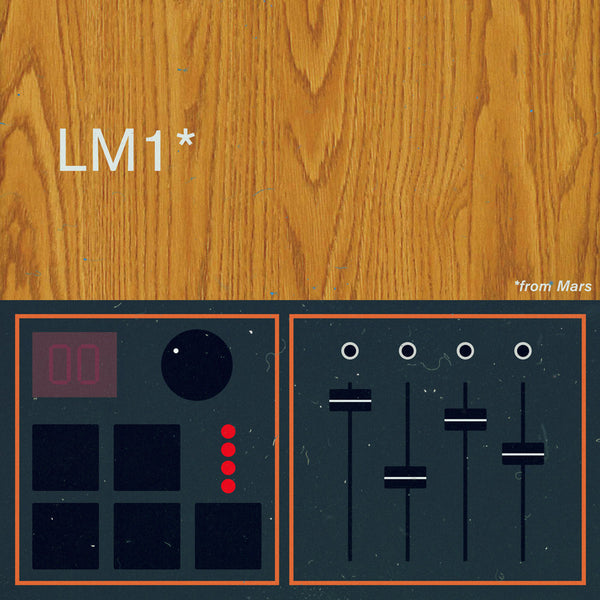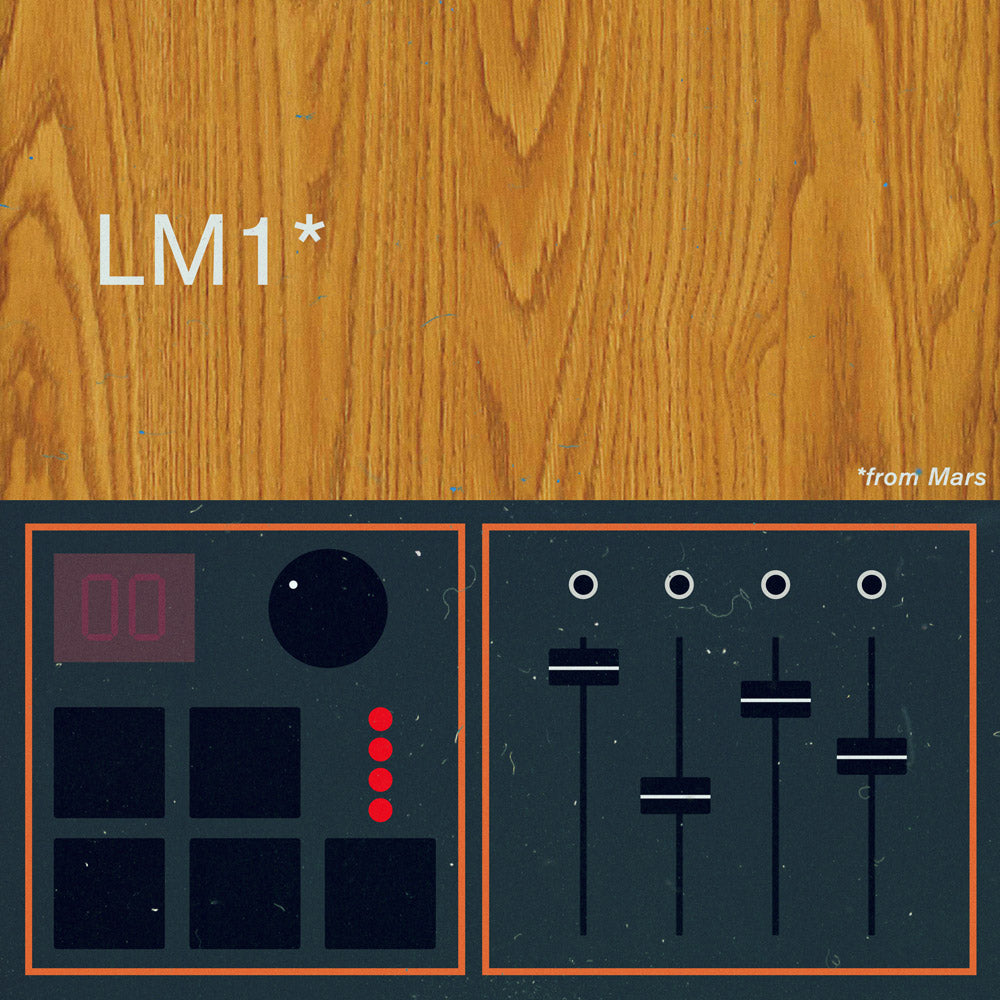LM1 FROM MARS
$39.00 $19.50
The Most Comprehensive LM1 Sample Pack Yet
The LM1 is one of the most rare and sought after drum machines of all time, and as a result, not many sample packs exist. And the ones that do are either incomplete, low quality, or have the wrong sounds (many units are unknowingly loaded with custom samples).
So, after waiting around for years trying to locate one, we ended up finding two in the same week this year. Needless to say, we were excited, and set forth creating the most comprehensive and highest quality LM1 pack in existence. With extreme attention to detail, we multi-sampled a combination of both units, at as many pitches, decays and even round robin (Hi Hats) as we could, without going overboard! Everything was run both cleanly and heavily processed through our API 1608 console and Apogee Symphony MKII.

A Ground Breaking Machine for its Time
Introduced in 1980, the LM1 was based around 8 bit, 28kHz digital samples of a drummer (who is unknown!) passed through analog filters. It was the first drum machine to introduce record quantize and shuffle, which was a major accomplishment at the time.
Upon its release, the sound immediately became ingrained in pop culture, most notably by Prince (who was often mistaken for using the Linndrum) and followed by legends like Michael Jackson, Gary Numan and Roger Troutman. Its sounds were also most likely stolen by other drum machines of the era, including the Drumtraks, 707, DMX and more. Regardless, with its laid back groove, constantly changing hi hats, and crunchy, 80s drum sounds, the LM1 is an organic machine that oozes funk. It is a beast of a drum machine:
The Sound & the Groove
At the head of every sample is a long, low frequency waveform. I'm guessing this is air moving from the motion of the drummer about to hit the kick, snare, etc while recording the samples.
Whatever it is, this pre-head is precisely what gives the drum machine its signature laid back, funky feel that Prince loved so much. It allows the snare drum, for instance, to sit well after the bassdrum even though both are quantized to the same beat. And when you pitch each drum sound, this pre head becomes either shorter or longer - for every voice - so the pitch of the drums ends up hugely affecting the groove of the machine. Just look at this pre attack!

*We also included trimmed versions of these samples if you're after something a bit faster*
Hi Hats That Come Alive
The LM1 sounds ALIVE (especially considering it is not analog) and this is due largely to how the hi hats work. There is just one sample: a sizzling open hi hat (it almost sounds like an LFO). The closed Hi Hats (you get Accent and No Accent) are created by an analog VCA that opens and closes the open hi hat sample. Because the attack and release of the gate is always changing, so are the hi hat transients. Plus, each hi hat button's gate sounds slightly different. And finally, there's a hi hat decay knob!
This all leads to quite dynamic hi hats (and sample anxiety!). To re-create this without going overboard, we captured three different versions of each hi hat, at 4 different decays, and 30 different pitches. The hi hats alone are as big as the rest of the pack, at over 1600 samples, but as a result, when used in a "round robin" sampler, in combination with the different decays, they really come alive:
The Recording Chain
The recording process was broken into two parts: clean and color. Both the clean and color versions include up to 30 pitches per drum voice, including round robin hi hats at 4 different decays for every pitch.
The LM1 was first recorded cleanly, at low volume through our API 1608 console, through the cleanest possible balanced power, directly into our Apogee Symphony MKII converter. Without any processing, the beauty of this drum machine is clear. The clean samples sound amazing and ready to go.

The color versions were also recorded through our API 1608; we drove the input hot (sometimes creating duplicate channels and running one even more distorted). The 1608 can be saturated much harder than its API 500 series counterparts since there are so many more transformers. The benefit of console saturation is that, as opposed to using a bunch of different distortion devices (which we tried at first), using only the console resulted in a much more cohesive color, allowing the samples to play like one instrument.
We also used our API 560, API 550B, some slight API 2500 Compression, and the Overstayer Saturator, to create colored hits. These are mostly subtle colors that bring up the RMS, make the sounds a bit darker, and add more hardware harmonics so they cut through a mix more easily. But, we made sure to smash some bass drums, snares and toms for all of your dirtier needs.
Why We Sampled Two
It seems that every LM1 sounds a bit different - not in the same way that every 808 varies, but because so many LM1 owners modified them in various ways that suit their needs. People loaded their own sounds (Most LM1 sample packs unknowingly have the wrong sounds because of this), and some even had their EPROMs edited to get rid of that funky head at the top of snare samples.
The first LM1 we sampled comprises the majority of the drum hits in this pack. In all aspects, this was a traditional LM1 with working filters and no chopped EPROMs - except that instead of Congas it had a second pair of Toms. AND - Quincy Jones modified the unit to have a Ride and Crash Cymbal! The crash is identical to the one on Prince's "777" - it's a non standard crash that I haven't heard anywhere else, so it is likely this unit may have been used on that recording.
The second LM1 (ours) had the filter removed from the Bass Drum and Toms. That, or the filter is broken. Either way, this allows for a much more cutting Bass Drum, closer to a 707 (which I'm told may have stolen sounds from the LM1). It also had those original congas we were after.

So, we combined the best aspects of both LM1s and were able to create a super extensive pack, offering both filtered and non filtered bass drums and toms, all original sounds, a crash and ride, and even trimmed versions of the bass drum, snare, toms and cowbells.
The End Result
The end result is a detailed, well organized and extremely high quality collection of LM1 samples that allows you to just as easily dive deep into any individual sound at any pitch, or just jam out on the pre built kits. The LM1 is a beast - I hope you enjoy it!
Contents:
- 3,374 24bit WAV LM1 Samples
- (12) 16x Hit Kits for easy jamming
- Clean & Color versions of all samples
- Original Bass Drum, Snare Drum, Rim, Clap, Hi Hats, Conga, Tambourine, Cabasa, Cowbell
- Additional: No Filter Bass Drum, No Filter Tom, Crash, Ride, and Trimmed samples
- Heavily multi-sampled: up to 30 pitches per voice & round robin hi hats at different decays
- Sampled through an API 1608 console and Apogee Symphony
- 100% Hardware processing
- (8) Midi Groove templates capture the LM1's signature quantize & shuffle
- 211.3 MB Unzipped
- LM1 - About
Formatting:
- Ableton includes (1) master drum rack containing all samples, with Macros for selecting LM1 pitch, clean / color, Hi Hat Decay & Round Robin. (12) pre-made kits racks, and 6 groove clips
- Kontakt, Logic, Reason, SFZ include: (107) individual hit and kit instruments
- Maschine, Battery & FL Studio include: 12 pre-made kits
- MPC1000 & MPC2500 include: 12 pre-made kits on 3 MPC Programs
- 8x Midi & Ableton Groove Templates
- 211.3 MB Unzipped
Ready For:
- Any 24 bit WAV Compatible DAW or Sampler
- Ableton Live 9.7+ (Not Intro)
- Kontakt 5.6.5+ (Not Kontakt Player)
- Logic 9+
- Maschine 2.6+
- Reason 8+
- Battery 4.1.5+
- FL Studio 20.8+
- MPC1000 or MPC2500
Contents:
- 3,374 24bit WAV LM1 Samples
- (12) 16x Hit Kits for easy jamming
- Clean & Color versions of all samples
- Original Bass Drum, Snare Drum, Rim, Clap, Hi Hats, Conga, Tambourine, Cabasa, Cowbell
- Additional: No Filter Bass Drum, No Filter Tom, Crash, Ride, and Trimmed samples
- Heavily multi-sampled: up to 30 pitches per voice & round robin hi hats at different decays
- Sampled through an API 1608 console and Apogee Symphony
- 100% Hardware processing
- (8) Midi Groove templates capture the LM1's signature quantize & shuffle
- 211.3 MB Unzipped
- LM1 - About
Formatting:
- Ableton includes (1) master drum rack containing all samples, with Macros for selecting LM1 pitch, clean / color, Hi Hat Decay & Round Robin. (12) pre-made kits racks, and 6 groove clips
- Kontakt, Logic, Reason, SFZ include: (107) individual hit and kit instruments
- Maschine, Battery & FL Studio include: 12 pre-made kits
- MPC1000 & MPC2500 include: 12 pre-made kits on 3 MPC Programs
- 8x Midi & Ableton Groove Templates
- 211.3 MB Unzipped
Ready For:
- Any 24 bit WAV Compatible DAW or Sampler
- Ableton Live 9.7+ (Not Intro)
- Kontakt 5.6.5+ (Not Kontakt Player)
- Logic 9+
- Maschine 2.6+
- Reason 8+
- Battery 4.1.5+
- FL Studio 20.8+
- MPC1000 or MPC2500










